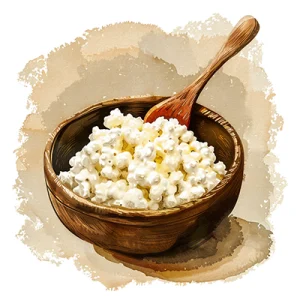WHAT TO DO ONCE YOUR JUN TEA SCOBY ARRIVES:
Your order will contain a single organic Jun Tea Scoby and some starter tea. Once you receive your organic Jun Tea Scoby from us, it’s best to get it fermenting as soon as possible. However, it will keep in the original packaging at room temperature until the activation date on the back of the packet.
You will probably notice some brown patches on your organic Jun Tea Scoby and some brown, string-like objects floating around in your starter tea. Don’t worry; these are simply yeasts and a normal part of the Jun Tea process. People often mistake these for mould, which they are not. So don’t panic when you see them. If you want further reassurance on the yeasts found when making Jun Tea, please do get in touch with us.
JUN TEA AND METAL:
You will often hear that you should not use metal utensils while making Jun Tea. Although this holds some truth, it has been greatly exaggerated! Jun Tea gets very acidic, if left in contact with metals for long periods of time, in theory it could degrade and rust the metal. That metal would then end up in the Jun Tea and eventually in you. However, using a stainless steel strainer/sieve or spoon while making Jun Tea will not cause any problems. The contact time between the metal utensils and Jun Tea will always be very short. Never leave anything metal in contact with Jun Tea for long periods of time.
BREWING JAR:
You need something to brew your Jun Tea in. We recommend using something glass. Glass is much easier to clean and keep sterile. Plastic tends to degrade over time and is prone to scratches which can harbour unwanted bacteria. Plastic also carries a risk of chemical contamination from the materials contained inside of it such as BPA. A glass Kilner style jam jar is perfect to use.
STRAINER/SIEVE:
You also need a plastic strainer.
WATER FILTER:
We also recommend you buy a water filter to remove the chlorine from your tap water. You can use bottled water, but this tends to get expensive.
JAR COVER:
You also need something to cover your jar with. We recommend paper kitchen towels as they are easy to discard and replace. You can also use a muslin cloth or similar if you wish. Rubber bands also come in handy to secure the cover to the jar. You can also remove the rubber seal from the lid of any swing top jar (such as the Kilner jars supplied in our kits). With the seal removed you can close the lid while still allowing airflow during fermentation.
SAUCEPAN: You need a metal saucepan to heat the water in.
GLASS BOTTLES: You also need some bottles to store your Jun Tea in. Again we recommend using glass bottles. We find screw lid style bottles suitable for fermentation work best with Jun Tea. If you are worried about explosions and glass, you can use plastic bottles. Plastic tends to degrade quickly. It also carries a risk breaking down into the mixture due to the acidness of Jun Tea. Make sure you use BPA free plastic. It is important when using glass bottles to check and burp (release some of the gas build up) daily to minimise the risk of explosions.
FUNNEL:
It is useful to get a funnel to help pour the liquid into the bottles.
GLASS/PLASTIC MEASURING JUG:
It is also useful to have something to decant your strained mixture into. Glass or plastic measuring jugs are perfect.
WHAT INGREDIENTS DO I NEED?
You only need 3 ingredients to make Jun Tea. Green tea, water and honey. You can use either loose tea or tea bags. You can use any green tea to make Jun Tea. However the better quality tea you use, the better the end result will be.
The water used must not be chlorinated. This is very important as chlorine will damage and possibly kill your organic Jun Tea Scoby.
We recommend while first starting out with your Jun Tea that you only use a good honey. You can use a variety of different types of honey to make Jun Tea, including the very basic cheap stuff supermarkets sell. However, the best tasting Jun Tea comes from using a good honey. We want you to experience a great tasting Jun Tea for your first experience. We recommend using organic raw honey which tastes amazing. Experiment with different types of honey to find what tastes best for your Jun Tea.
BREWING YOUR TEA:
For 1 litre Jun Tea Scoby: Add 900ml of non-chlorinated water to your saucepan.
For 2 litre Jun Tea Scoby: Add 1800ml of non-chlorinated water to your saucepan.
For 5 litre Jun Tea Scoby: Add 4500ml of non-chlorinated water to your saucepan.
Heat the water. You do not need to bring the water to boiling point. Doing so can ruin the flavour of your Jun Tea. Ideally, you want the mixture to be between 65 to 80 Celsius. You can use a thermometer to check the temperature. However, just bringing the water to the stage just before it boils is adequate. If it does boil, simply allow it to cool back down for 10 minutes. Ensure you stir the mixture regularly as the water heats up so the honey dissolves.
For 1 litre Jun Tea Scoby: Add 10g of tea (2 teabags) to the water.
For 2 litre Jun Tea Scoby: Add 20g of tea (4 teabags) to the water.
For 5 litre Jun Tea Scoby: Add 50g of tea (10 teabags) to the water.
Allow the tea too steep for around 15 minutes. If you have used loose tea, you will now need to strain out any tea leaves that may be left in the mixture. It is important to do this as any remaining tea leaves may go mouldy and can contaminate your Jun Tea. Don’t over steep your tea as this will lead to a bitter taste.
Next, allow your mixture cool back down to room temperature (21 Celsius). Now add the honey to the mixture and stir it really well so that it incorporates into the tea.
For 1 litre Jun Tea Scoby: Add 60g of honey.
For 2 litre Jun Tea Scoby: Add 120g of honey.
For 5 litre Jun Tea Scoby: Add 300g of honey.
THE FIRST BREW:
Pour the cooled mixture into your fermentation jar. Add the starter tea we sent you with your order. It is important to add the starter tea to each batch of Jun Tea you brew. This helps reduce the risk of contamination from pathogens, and other unwanted bacteria by ensuring established Jun tea bacteria is the first to arrive into the mixture. It also lowers the PH of the mixture to a safe level.
Add your Jun tea Scoby, cover the jar and leave it at room temperature for 3-4 days. Jun Tea prefers a slightly cooler temperature compared to Kombucha. The optimum temperature for Jun Tea is 16-19 degrees celsius. After 3 days the Jun Tea will still be fairly sweet, at 5 it will have become more tart. This is a taste preference that you will acquire in your time making Jun Tea. Personally, we prefer our Jun Tea at around the 3 day mark.
Jun Tea ferments best during the winter months.
The temperature will play a large part in the brewing process. During the warm summer months, a much shorter time is required to make Jun Tea (1-2 days). If the temperature gets above 25 degrees celsius, you will find that Jun Tea can struggle to ferment well. You may also notice a decrease in the speed that a new Scoby forms. Sadly, during warm times it can be very difficult to make good Jun Tea. You will need to be patient until temperatures cool down again. Continue to feed your Jun Tea fresh honey and tea on a weekly basis to keep it healthy. Otherwise you run the risk of problems such as mould. You can also put them into a Jun Tea hotel for long term storage (see below).
Never leave any fermenting product in direct sunlight. This can lead to unwanted bacteria and pathogens forming.
Remove the Jun Tea Scoby from the jar, remembering to take 10% of the Jun Tea to use as the starter tea for your next batch. It is always best to take the starter tea from the top of the Jun Tea mixture, as this contains the most bacteria.
We recommend you use a clean, sterile jar for each batch of Jun Tea that you brew.
BOTTLING THE JUN TEA:
Using your plastic funnel, pour the remaining Jun Tea liquid into your glass bottles and then seal them by closing the lids. You can at this stage choose to add additional flavourings to your Jun Tea. This is optional, but many find experimenting with different types of fruit great addition to making Jun Tea. We like to use fresh strawberries ourselves. Experiment with different flavours, Google has many recipes online.
Leaving the bottled Jun Tea at room temperature (21 Celsius) for another 3-7 days will allow the Jun Tea to carbonate. This is optional, and you can drink you Jun Tea right away.
During the colder winter months it can take longer to carbonate. Anything from 7-14 days.
Place your bottles in the fridge to cool. Be very careful when opening the bottles. Jun Tea produces an extremely fizzy beverage that is prone to exploding out the bottle.
PLEASE NOTE:
If you have more than one fermenting food culture at home, we recommend that you keep them at least 1 metre apart from each other at all times. This is to stop cross contamination of the different cultures. If you are working with dairy in particular, this is very important. Please contact us is you require further assistance with fermenting more than one culture.





